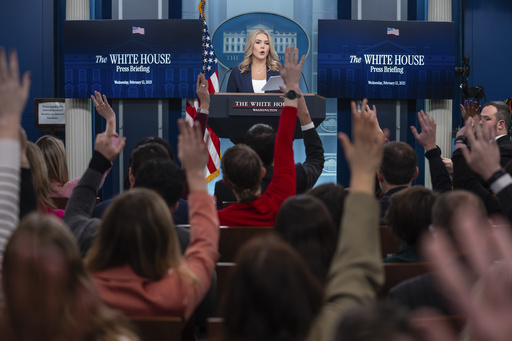
In recent weeks, since Donald Trump’s reinstatement in office, there has been a chorus of concern from Democrats and legal experts about a potential constitutional crisis. They allege that Trump is attempting to expand his authority while circumventing laws that impede his agenda. In response, the White House, through press secretary Karoline Leavitt, contends that the true source of the problem lies not with the President but with judges who deem aspects of his agenda illegal.
Leavitt declared to reporters that these judges are engaging in judicial activism instead of fairly interpreting the law, asserting that “the real constitutional crisis is taking place within our judicial branch.” This defense, articulated during a White House briefing, reflects a growing trend among Trump and his supporters, who have increasingly criticized the judicial system.
These attacks have included sharing images of judges, launching personal attacks on their families, and even calling for the president to disregard their rulings. Republican Senator Mike Lee from Utah is reportedly moving forward with legislation aimed at restricting lower-level judges from issuing nationwide injunctions against presidential actions.
Elon Musk, a key advisor to Trump, has used his platform on X to amplify these criticisms, famously referring to a judge opposing the Trump administration’s mandate surrounding health-related information as “evil” and stating that the judge “must be fired” for requiring the Trump administration to restore critical public health webpages.
Such rhetoric has raised alarms among legal scholars, who suggest that the core principle of judicial review—whereby the courts ensure that other branches of government operate within legal bounds—is under threat. Legal experts have noted that historically, it has been the courts’ role to determine the legitimacy of executive power.
While courts have indeed posed obstacles to Trump’s agenda, especially with a Congress largely supportive of him, they have become a necessary check on the executive branch’s actions. Several judicial rulings have temporarily halted Trump’s proposals regarding birthright citizenship and prevented Musk’s agency from accessing certain treasury systems.
Interestingly, some judges who have ruled against Trump were appointed by him or by other Republican presidents, indicating that the issue transcends party lines. In certain cases, judges have sided with the administration, yet the prevailing trend remains one of legal challenges to many executive actions.
Recent developments include a Boston judge who let Trump’s initiative to reduce the federal workforce progress after it had faced an initial obstruction. This plan aims to provide financial incentives for government employees to vacate their positions, a move supported by both Trump and Musk.
Despite accusations of defying court orders, Trump maintained in the Oval Office that he adheres to the law and will pursue appeals against judicial decisions he finds adverse. He has voiced frustration over what he perceives as judicial obstacles obstructing his efforts to eliminate perceived government corruption.
Claire Finkelstein, a law professor at the University of Pennsylvania, noted a concerted attempt to vilify judges, warning that while it may be implausible to remove judges, there’s a strategy at play to make their tenure difficult, potentially leading them to resign.
Musk, who enjoys significant influence and was granted extensive authority by Trump to reduce federal operations, has gone so far as to call for the impeachment of judges ruling against the administration, labeling them corrupt.
Conversely, Vice President JD Vance articulated on social media that judges should not overstep by interfering with executive power, suggesting that such actions are beyond their legal purview. House Speaker Mike Johnson echoed Vance’s sentiments, calling for the courts to allow presidential processes to unfold without interference.
When pressed regarding the courts’ authority to issue nationwide injunctions against Trump’s directives, Leavitt asserted that these rulings lack legal foundation and that, while the White House intends to comply, it holds out hope for eventual vindication of its position.
Since Trump took office, over sixty lawsuits have emerged related to his actions, highlighting how legal complications often ensnare presidencies, irrespective of the party affiliation. Willy Jay, a former assistant solicitor general, remarked that while the volume of lawsuits is indeed abnormal, the frequency with which significant presidential actions face challenges from opposing state attorneys general has become a recurring theme over recent administrations.

